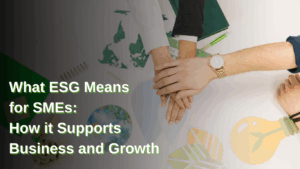Introduction
In Malaysia’s evolving business landscape, environmental, social and governance (“ESG”) is gradually attaining more traction, and it is no longer a mere buzzword. While there is no universal definition of ESG, ESG is generally understood as a framework to measure sustainability, ethical impact and governance.
While ESG practices are commonly adopted by listed companies and government-linked companies, the relevance of ESG to small and medium-sized enterprises (“SMEs”) in Malaysia have been growing. SMEs can benefit in the following ways by embracing ESG practices:
(a) Investors are more likely to invest in businesses with strong ESG performance due to lower risk exposure and enhanced operational efficiency of these companies. As a result of this, SMEs that adopt ESG practices may find it easier to secure funding and business opportunities.
(b) SMEs may be eligible for government incentives aimed at promoting ESG compliance and sustainability incentives such as Green Investment Tax Allowance available for companies seeking to acquire qualifying green technology assets or those undertaking qualifying green technology projects for business or own consumption or Green Investment Tax Exemption for qualifying green technology service provider companies.
(c) Implementation of recycling and waste reduction programmes can lead to cost savings.
(d) ESG adoption helps SMEs avoid fines and regulatory penalties.
This article aims to explore how ESG supports business and growth of SMEs from the aspect of mergers and acquisitions (“M&A”) and initial public offerings (“IPO”).
ESG in M&A
Expansion of ESG in Due Diligence Exercise
Generally, the scope of due diligence exercise during M&A transactions encompasses legal, tax and financial matters. However, with the growing influence of ESG practices, ESG due diligence has become integral to investment evaluation and strategies in M&A transactions. ESG due diligence can reveal a company’s sustainability practices and environmental impact, treatment to employees, stakeholders and communities, and compliance with relevant laws, regulations and guidelines relating to ESG matters.
ESG due diligence enables SMEs to discover opportunities that can strengthen their efficiency and competitiveness as well as advocate sustainable development which will benefit the broader well-being of the society and the environment in the long run.
Inclusion of Conditions Precedent Pertaining to ESG in the Share Sale and Purchase Agreement (“SPA”)
A condition precedent in an SPA is a condition which is required to be fulfilled before a SPA can be rendered unconditional and for transactions to proceed further. Potential investors or buyers may require target companies to resolve issues discovered during due diligence for M&A transactions before they complete the transactions. ESG-related condition precedents may include the taking steps to address regulatory non-compliance or implementation of an anti-bribery and corruption policy.
By integrating ESG-related conditions precedent, it signifies to the investors that SMEs value sustainability which would enhance SMEs’ reputation and credibility to investors and stakeholders.
Inclusion of Representations and Warranties Relating to ESG in the SPA
In an SPA, sellers typically provide representations and warranties for the benefit of purchasers. Representations are assertions of fact, while warranties are guarantees that these assertions are true, often accompanied by a contractual obligation to compensate the other party if they prove to be false. Typical ESG-related representation and warranty include compliance with environmental laws, no pending environmental investigations, compliance with employment laws and regulations, no use of forced, child, or trafficked labor and implementation of code of ethics or conduct for directors, officers and employees.
The inclusion of ESG-related representations and warranties in SPAs provides assurance to investors, while encouraging SMEs to improve internal systems to enhance compliance and position themselves as responsible and sustainable businesses.
ESG in IPO
Pre-IPO Considerations
Good ESG practices are important for SMEs intending to undertake an IPO and listing on the stock exchange in Malaysia, as they help investors assess the viability and risks associated with investing in these SMEs.
Companies planning an IPO are required to issue a prospectus, the contents of which are prescribed by the Prospectus Guidelines issued by the Securities Commission Malaysia (“SC”). In particular, paragraph 5.02(j) of the Prospectus Guidelines sets out the following disclosure requirement in the prospectus:
(i) the relevant laws or regulations governing the conduct of the group companies on business and environmental issue which may materially affect the group’s business or operations; and
(ii) the information on the non-compliance.
To facilitate disclosure in prospectus and to demonstrate good corporate governance, it would be prudent for SMEs which intend to be listed on the stock exchange in Malaysia to adopt ESG practices as earlier as possible. Non-compliance with laws and regulations may delay an IPO and listing exercise as regulators may require an applicant to address its non-compliance before the regulators give their approvals for the IPO and listing.
Bursa Malaysia Securities Berhad (“Bursa Malaysia”) has also issued the Sustainability Reporting Guide as a guidance for listed companies to prepare their sustainability statement. Sustainability statement (“Sustainability Statement”) is a narrative statement of the listed companies’ management of material economic, environmental and social risks and opportunities in the manner as prescribed by Bursa Malaysia. In preparation for IPO, SMEs may consider implementing the following practices advocated in the Sustainability Reporting Guide:
- carrying out materiality assessment;
- identifying and categorising sustainability issues in a list of sustainability matters;
- engaging with stakeholders;
- prioritising sustainability matters; and
- reviewing the materiality assessment on a yearly basis.
Post-Listing Requirements
Listed companies on the Main Market and ACE Market in Malaysia are required to comply with the Main Market Listing Requirements (“MMLR”) and the ACE Market Listing Requirements (“AMLR”) respectively.
The MMLR and AMLR set out the requirements for listed companies to make sustainability-related disclosures in their annual reports by including narrative statement of the listed companies’ management of sustainability-related risks and opportunities, as prescribed by Bursa Malaysia. Listed companies on the Main Market and ACE Market must ensure that the Sustainability Statement is prepared in accordance with the IFRS S1 General Requirements for Disclosure of Sustainability-related Financial Information and IFRS S2 Climate-related Disclosures. The listed companies must include the metrics and targets that demonstrate their performance and progress in relation to their sustainability-related risks and opportunities for the last three financial years in the Sustainability Statement. Bursa Malaysia has issued the Sustainability Reporting Guide to assist listed companies in preparing the Sustainability Statement.
Simplified ESG Disclosure Guide (“SEDG”) for SMEs in Supply Chains
The SEDG is developed by Capital Markets Malaysia, an affiliate of the SC with the objective providing guidance to SMEs in preparing ESG data for their stakeholders which align with international standards. The SEDG also provides SMEs with a simple and standard set of disclosures to track and report, and it covers indicators that can be tracked and disclosed to measure ESG progress.
There are 35 disclosures divided into Basic, Intermediate and Advanced in the SEDG to cater for the different levels of sustainability maturity of each SME. The SEDG can be a useful starting point for SMEs to embrace ESG practices.
Conclusion
ESG is increasingly a key consideration for investors seeking to invest in SMEs, whether through M&As or IPOs. SMEs looking to bring themselves to the next level of growth should assess their business operations for gaps in ESG compliance. Engaging legal counsel to identify these gaps and develop a robust internal framework demonstrates a company’s commitment to responsible business practices. This strengthens the SME’s reputation as well as builds investor confidence, positioning the company as a credible and sustainable investment opportunity.

This article is authored by our Partner, Ms Wong Mei Ying and Associate, Ms Lim Jia Wen (Trisha). The information in this article is intended only to provide general information and does not constitute any legal opinion or professional advice.
Written by:

WONG MEI YING, Partner, Corporate & Commercial
[email protected]

LIM JIA WEN (TRISHA), Associate
[email protected]